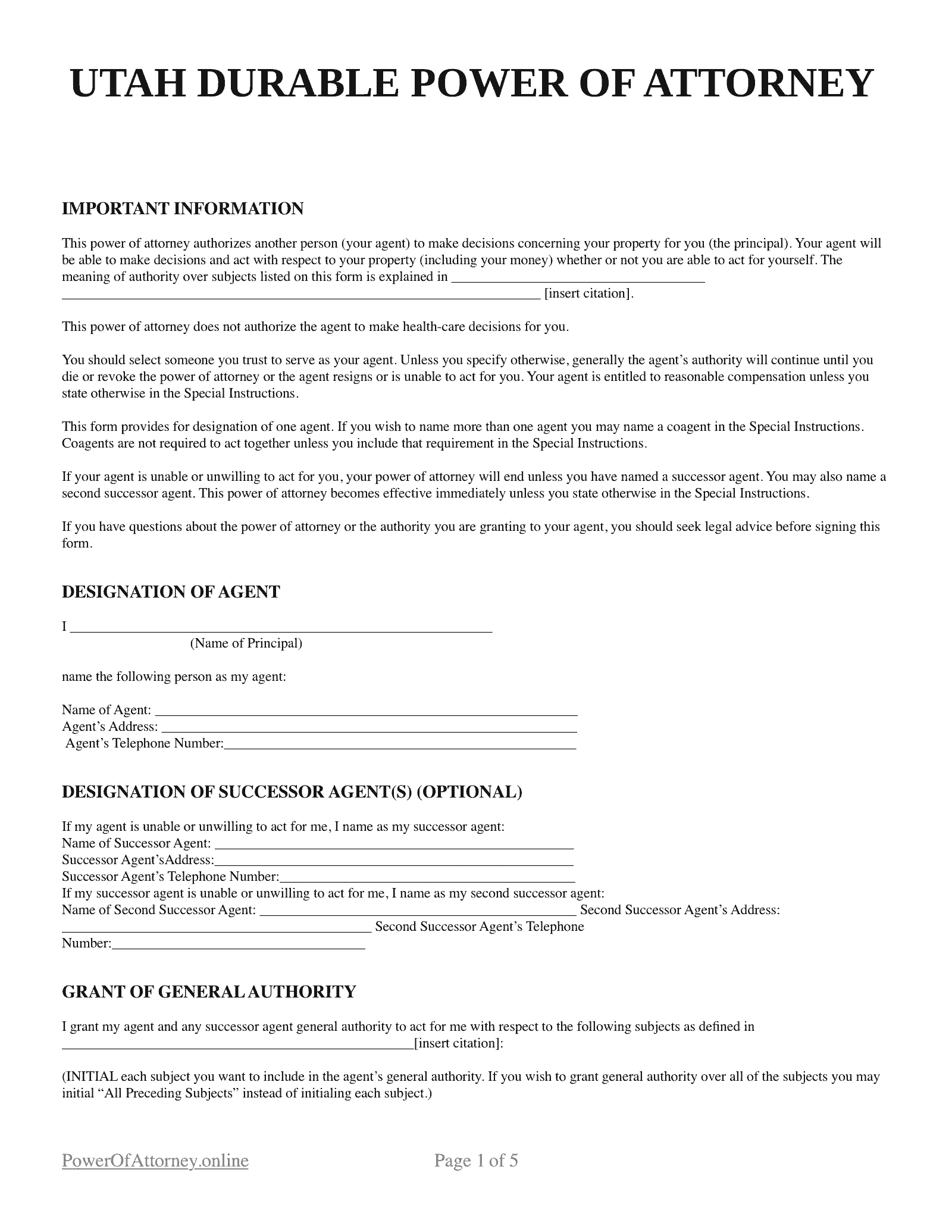Free Utah Durable Power of Attorney Forms
A Durable Power of Attorney (DPOA) in Utah is a legal form that allows you to grant someone, referred to as the “agent” or “attorney-in-fact,” to manage your affairs if you are not able to do so yourself.
This document differs from a healthcare power of attorney, focusing primarily on financial and personal decisions. A DPOA also remains valid even if you, as the principal, become incapacitated or mentally incompetent.

Utah Durable Power of Attorney Laws
Various acts and statutes provide specific guidelines for the creation and use of a Durable Power of Attorney in Utah.
- Statute: The general provisions for the power of attorney in Utah are outlined in UT Code § 75-9-104, part of the Uniform Power of Attorney Act. This statute provides the framework for how a power of attorney should be structured and executed in the state.
- Durable definition: “Durable,' with respect to a power of attorney, means not terminated by the principal’s incapacity” (UT Code § 75-9-102(2)).
- Signing requirements: You must sign your DPA in accordance with state requirements (UT Code § 75-9-105).
Signing Requirements in Utah
To ensure your document is considered legally valid, you must satisfy the requirements set by the state of Utah when signing your DPOA.
- Signing requirements: The DPOA must be signed in the presence of a notary public (UT Code §75-9-105).
This step is essential to authenticate your signature and ensure your document is enforceable.
How To Write a Durable POA in Utah
There are a number of steps you’ll need to take to ensure that your Durable Power of Attorney is clear and legally valid.
Follow these steps to create your form:
1. Choose your agent
The first thing you must do is select your agent. This person could be a family member, a close friend, or a professional advisor. They should possess sound judgment, especially in financial matters.
It's also a good idea to pick a successor agent in case your primary agent is unable or unwilling to serve.
2. Discuss the role with your agent
Before finalizing your decision, have a detailed discussion with your agent. Explain the extent of the powers you are granting and your expectations.
This conversation should cover their responsibilities and your preferences. Their duties should range from managing your finances to making critical decisions.
3. Decide on compensation
If your agent will be taking on significant responsibilities, consider whether you will offer compensation for their services.
This could be a structured fee or reimbursement for expenses. Clear communication about compensation can prevent misunderstandings in the future.
4. Download a Utah DPOA template
Take advantage of a printable Durable Power of Attorney template. This ensures that your document complies with Utah laws and will help you quickly create your document.
It will also help you avoid the need for a lawyer to create your form and having to pay hefty legal fees.
5. Fill out the form carefully
Complete the DPOA form with all the necessary details. Specify the powers you are granting, any limitations, the duration of the DPOA, and any other specific instructions you wish to include.
Ensure that the form aligns with your needs and legal requirements in Utah.
6. Sign in accordance with Utah law
Sign the document in the presence of a notary. This step is crucial for the legal validity of the document.
Your document may not be considered legally valid without following the signing requirements.
7. Store and distribute copies
Once signed, store the original DPOA in a secure location. Provide copies to your agent, successor agent, and perhaps a trusted family member or attorney.
The relevant parties must have access to your document if it becomes necessary to use it.